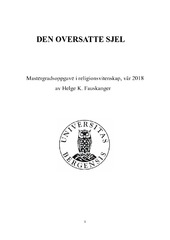| dc.description.abstract | This treatise (The Soul in Translation) discusses how the Norwegian Bible Society has treated the Greek word psykhē in its 1930, 1978 and 2011 Bible editions. It explores whether there is any theological bias evident in the renderings used, in particular whether the translators think of the soul as an immortal component in man and so favor the translation "soul" (Norwegian sjel) in scriptures where psykhē may seem to exist after death, while avoiding this translation in texts where psykhē appears to be mortal or perishable. All 102 occurrences of psykhē in the New Testament, and their renderings in the three translations, are listed and briefly discussed. To facilitate further discussion, these 102 occurrences are (ideally irrespective of the chosen Norwegian renderings) sorted into five or six semantic categories: 1) "Mundane" or non-profound uses of psykhē (scriptures where the word typically simply suggests "individual, person"), 2) the soul as the "salvation object" that is to be saved (or lost), 3) scriptures that refer to psykhē as perishable; 4) scriptures that may seem to refer to psykhē as existing after death, 5) the emotional or mental psykhē, 6) special cases that could be interpreted in various ways. A break-down of the translated wordings indicates that the 1930 version has the least varied renderings, overwhelmingly sticking to "life" and "soul"; the 1978 version represents the nadir of the use of the word "soul", many occurrences of psykhē now being swallowed up in various circumlocutions; in a number of cases psykhē is not separately translated at all. The 2011 version is generally similar, but somewhat increases the number of translations involving the word "soul", meaning that there is no consistent downward trajectory in the use of this term over eighty years of Norwegian Bible translations. It is explored how psykhē is translated in the five or six semantic categories outlined above. Especially in the 1978 and 2011 versions, there is a tendency to avoid the word "soul" in relatively mundane scriptures, as if it is a "religious" term that must be reserved for profound contexts (the 1930 version was less hesitant to use the word "soul" also in some places where it just seems to mean "person, individual"). Where psykhē may seem to exist after death, it is consistently rendered "soul". On the other hand, the translation "soul" is most rare, though not altogether absent, in verses where psykhē is described as perishable (James 5:20 being one relevant scripture where all the three translations use the word "soul"). Typically other renderings, like "life", are used in such verses. | en_US |
